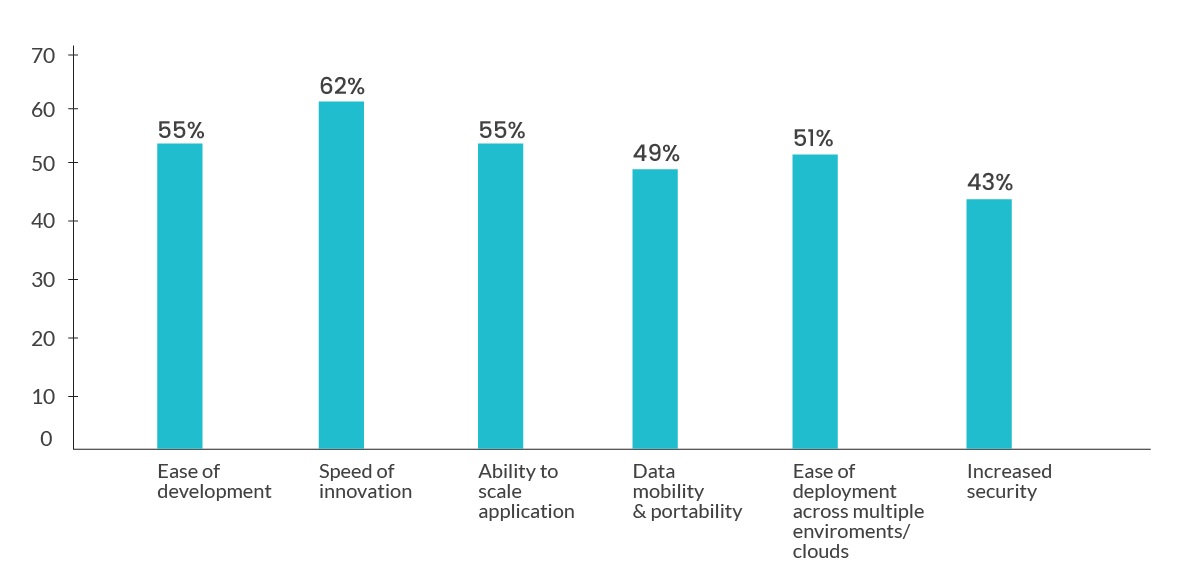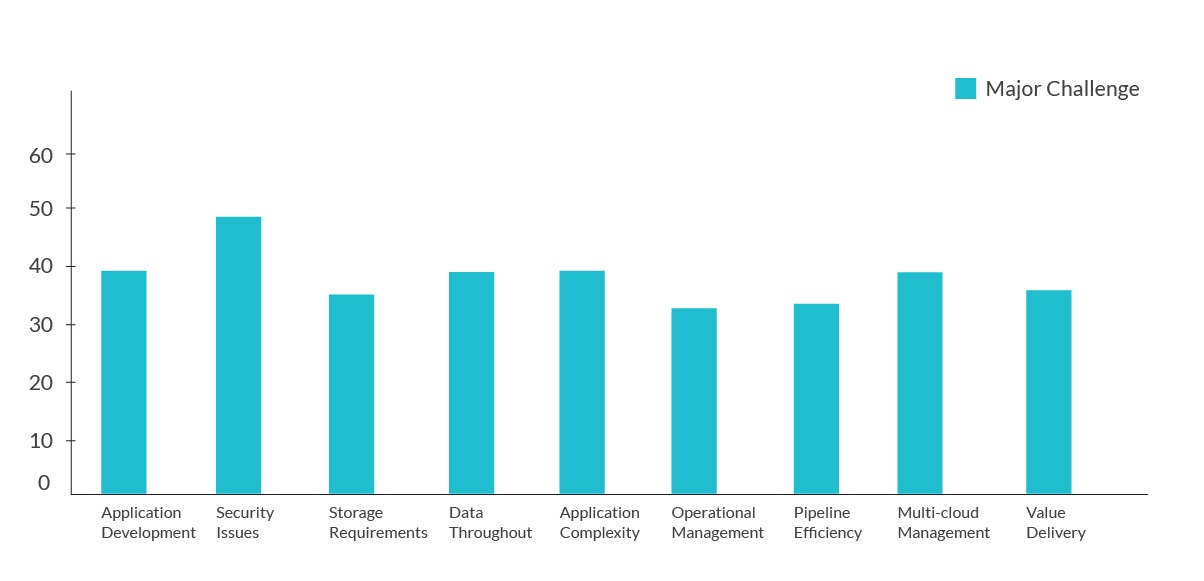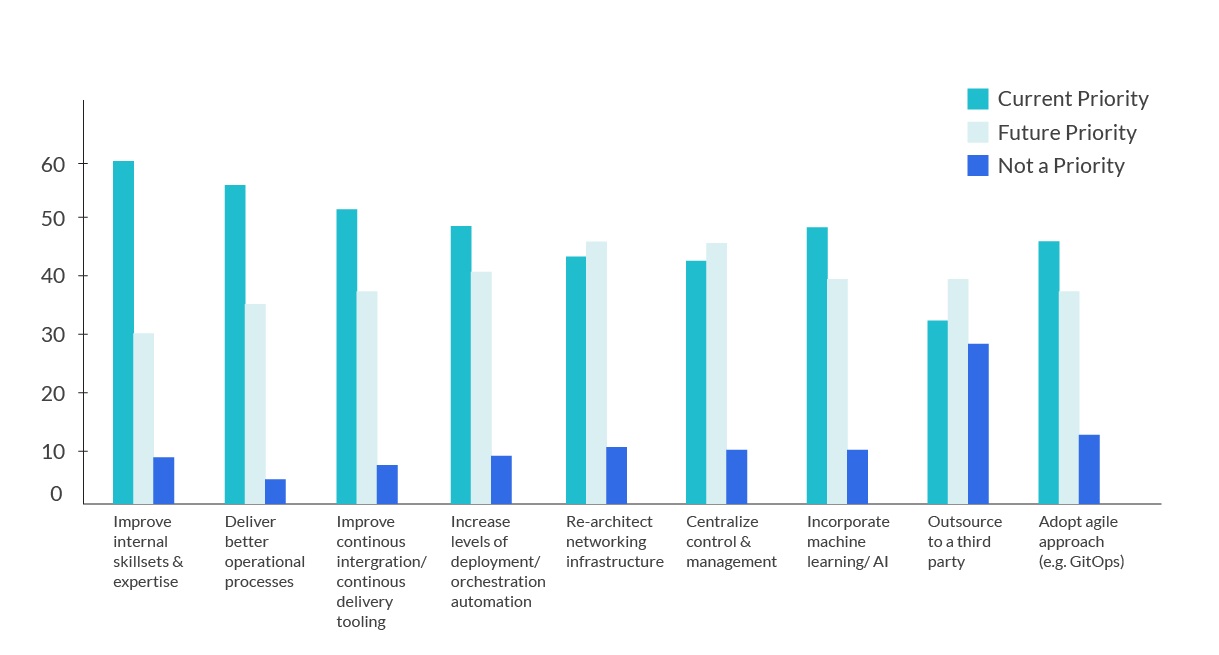Check Point® Software Technologies Ltd.(link is external) announced that U.S. News & World Report has named the company among its 2025-2026 list of Best Companies to Work For(link is external).
Kubernetes is here, and its use is growing. Nonetheless, while most (if not all) tech-influenced organizations might be talking about Kubernetes, only about a third are actually doing it. This blog outlines who those organizations are, how they are using Kubernetes, why they are using it, and what challenges they foresee from its application in the next two years.
Start with: Kubernetes State of Play - Part 1
5: Needs include automation and managing multi cloud, both fueling a need for speed
The results we received show that there are two leading requirements for organizations using Kubernetes: Automation (62%) and managing complex multi-cloud environments (60%). This is a reflection of the pressure on organizations to increase efficiency and productivity, and the growth of multi-cloud as the hosted technology landscape moves beyond point solutions. Federation of containers is also a strong use-case, but a full 20% behind automation (42%).
Kubernetes is being chosen, in this context, as it accelerates innovation, and makes complex systems easier to control and deploy. 62% percent of respondents said speed of innovation was a reason for adoption, and 55% said ease of adoption was a factor. Its ability to scale applications was also named by 55% of organizations, and ease of deployment across multiple environments and clouds was picked out by 52% of respondents.

6: Security and dealing with complexity are the problems orgs are dealing with today
The challenges organizations perceive around Kubernetes adoption are led by security. 48% list keeping on top of security issues as a major challenge. Managing multi-cloud architecture is seen as a challenge by 39% of respondents, and 38% felt that developing applications for the platform would be a major challenge. The complexity of deploying and exploiting Kubernetes was also clear, with 37% naming it as a major challenge.

7: Training is a pressing need for organizations
Unsurprisingly given its relative new-ness, organizations have concerns about the skill levels for utilizing Kubernetes: 60% cited improving internal skill sets and expertise as a top priority. Although any new technology platform will raise the importance of training and hiring policies, this is particularly high for Kubernetes, reflecting both its highly-specialized nature, and the impact the platform is having on the world of enterprise technology.
The survey results also repeatedly showed that the complexity of container systems and multi-cloud is a concern for organizations. This is reflected in organizations' desire to both improve operational processes (56%), and increase automation (48%), as a priority.

Conclusion
What can we surmise? In this age where everyone wants to say they are doing the "new new thing," it does appear that Kubernetes has significant traction. As well as the cooler end of the scale, it is being used to increase the usable life of legacy systems, to address big data challenges and take advantage of opportunities provided by multi-cloud systems, and to bring new services and customer interfaces to a wide variety of use cases.
Although it offers a large swathe of possibilities, it's clear that Kubernetes is a complex and challenging prospect, that will require investment, training and automation to realize its full potential. Organizations would do well to start down the track towards full Kubernetes deployment sooner rather than later, at the very least to establish skills and experience in advance of other organizations, as these will only increase in demand.
Industry News
Postman announced new capabilities that make it dramatically easier to design, test, deploy, and monitor AI agents and the APIs they rely on.
Opsera announced the expansion of its partnership with Databricks.
Postman announced Agent Mode, an AI-native assistant that delivers real productivity gains across the entire API lifecycle.
Progress Software announced the Q2 2025 release of Progress® Telerik® and Progress® Kendo UI®, the .NET and JavaScript UI libraries for modern application development.
Voltage Park announced the launch of its managed Kubernetes service.
Cobalt announced a set of powerful product enhancements within the Cobalt Offensive Security Platform aimed at helping customers scale security testing with greater clarity, automation, and control.
LambdaTest announced its partnership with Assembla, a cloud-based platform for version control and project management.
Salt Security unveiled Salt Illuminate, a platform that redefines how organizations adopt API security.
Workday announced a new unified, AI developer toolset to bring the power of Workday Illuminate directly into the hands of customer and partner developers, enabling them to easily customize and connect AI apps and agents on the Workday platform.
Pegasystems introduced Pega Agentic Process Fabric™, a service that orchestrates all AI agents and systems across an open agentic network for more reliable and accurate automation.
Fivetran announced that its Connector SDK now supports custom connectors for any data source.
Copado announced that Copado Robotic Testing is available in AWS Marketplace, a digital catalog with thousands of software listings from independent software vendors that make it easy to find, test, buy, and deploy software that runs on Amazon Web Services (AWS).
Check Point® Software Technologies Ltd.(link is external) announced major advancements to its family of Quantum Force Security Gateways(link is external).
Sauce Labs announced the general availability of iOS 18 testing on its Virtual Device Cloud (VDC).




